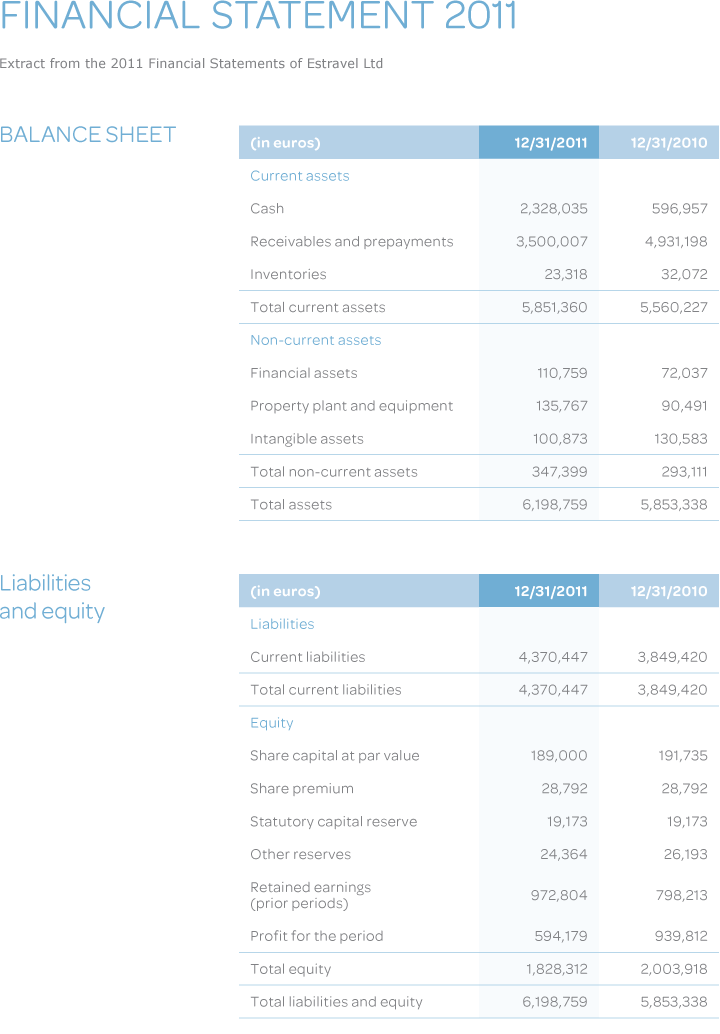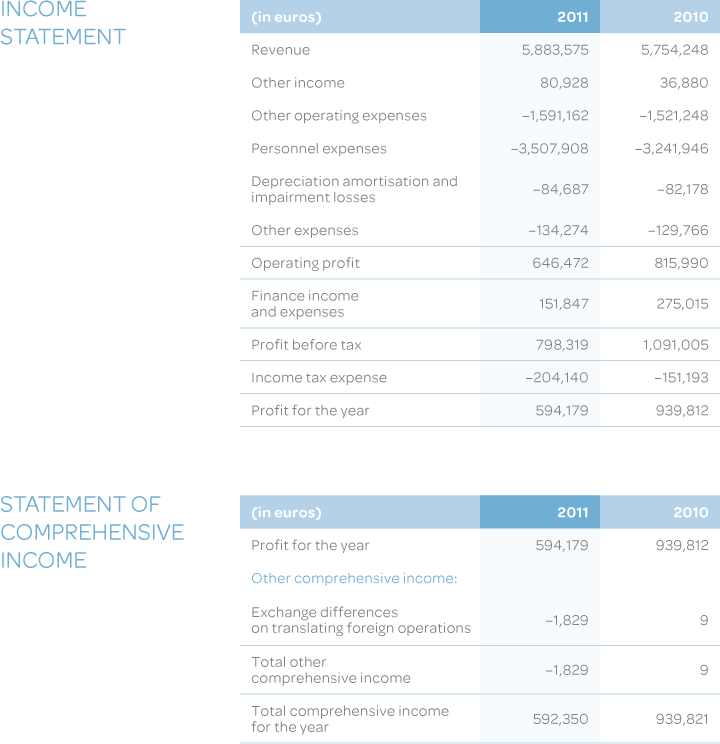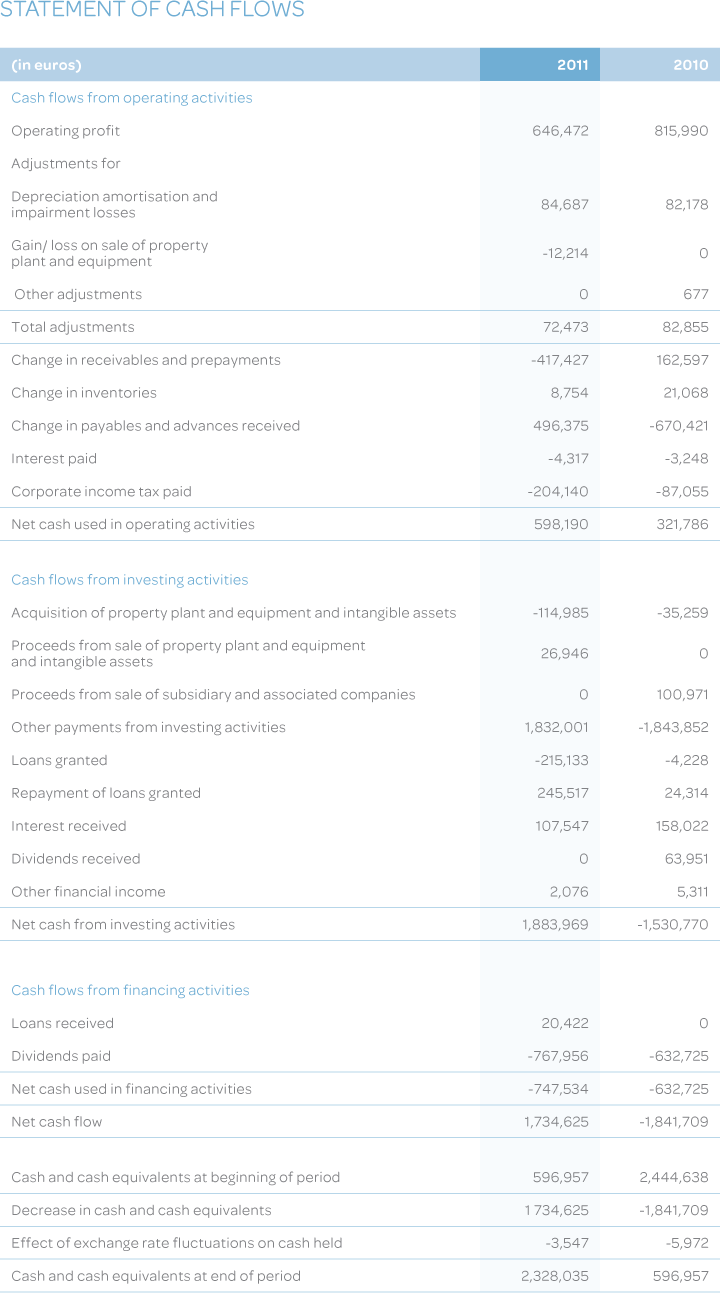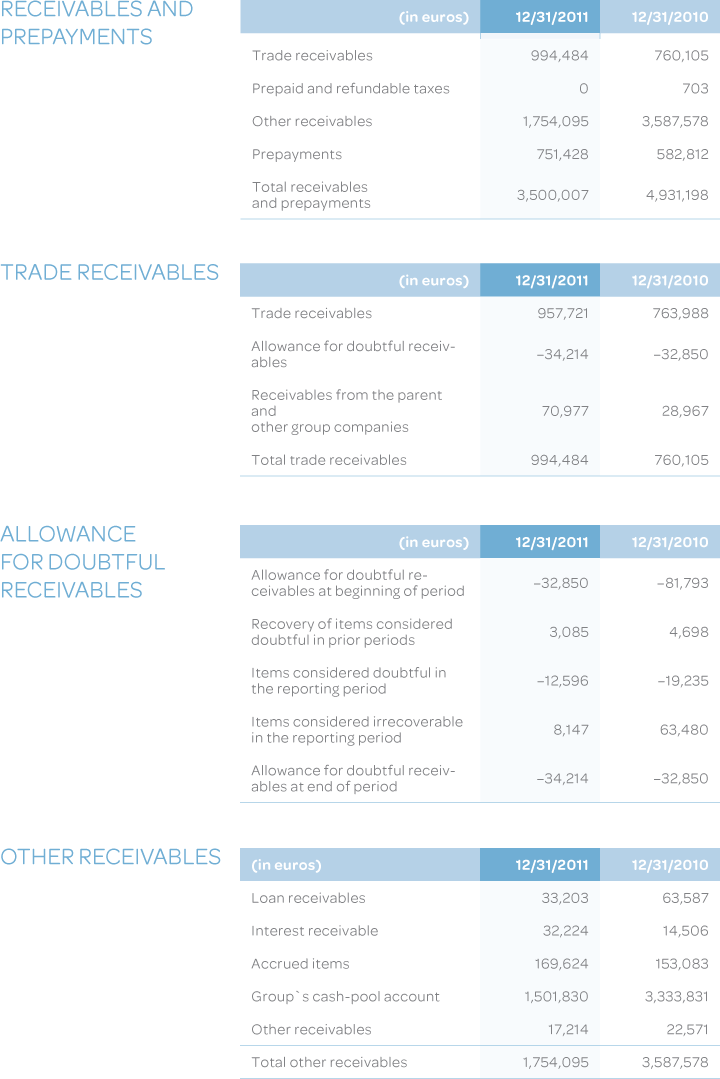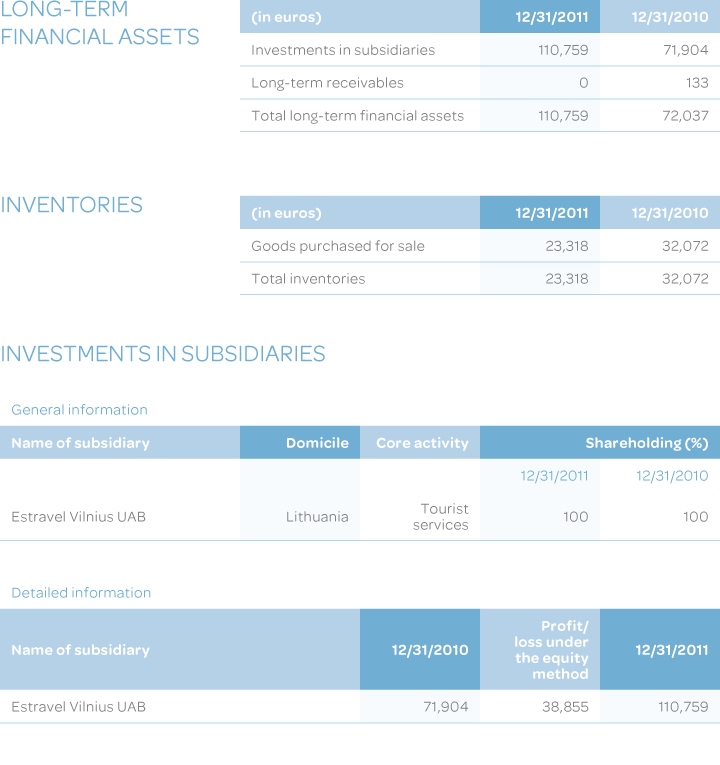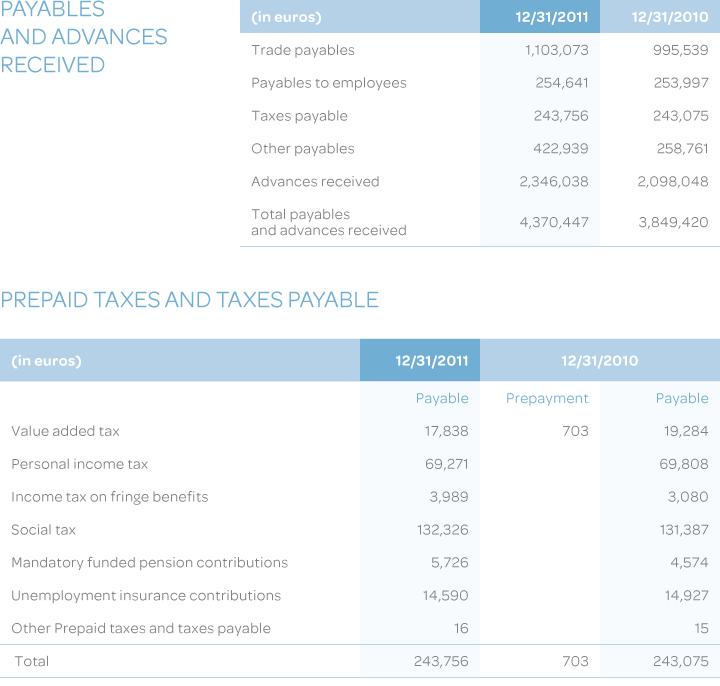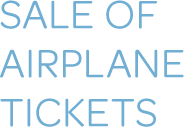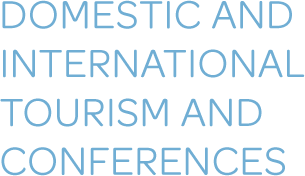- MANAGEMENT REPORT 2011
- Address by the managing director
- Financial highlights of Estravel AS
Summarised sales of Estravel Group - Sales by geographical areas
- Sales breakdown by customer group
- Package tour sales by operator
- Ferry ticket sales by carrier
- Sales breakdown by product
- Sale of airplane tickets
- Domestic and international tourism and conferences
- Leisure travel
- FINANCIAL STATEMENT 2011
- Balance sheet
- Income statement
- Statement of cash flows
- Receivables and prepayments
- Long-term financial assets
Inventories
Investments in subsidiaries - Payables and advances received
Prepaid taxes and taxes payable - Auditor’s report
- > Address by the managing director
- > Financial highlights of Estravel AS
Summarised sales of Estravel Group - > Sales by geographical areas
- > Sales breakdown by customer group
- > Package tour sales by operator
- > Ferry ticket sales by carrier
- > Sales breakdown by product
- > Sale of airplane tickets
- > Domestic and international tourism and conferences
- > Leisure travel
Extract from the 2011 Financial Statements of Estravel Ltd
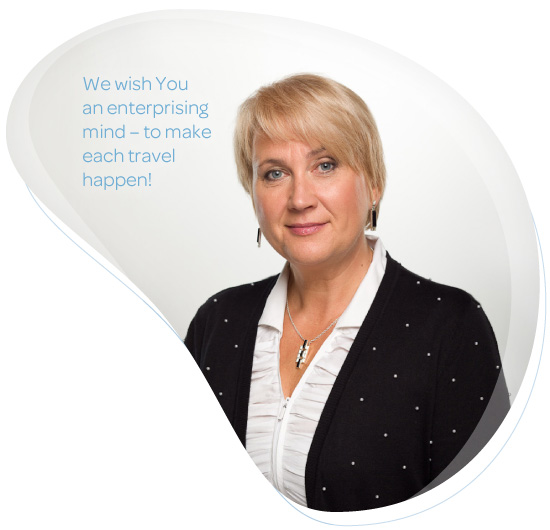
2011 brought about positive changes in travelling. The number of people travelling for both business and pleasure began to increase again. Estravel was ready for the market revival and our travel consultants were in their best form ever to serve clients. As a result, 2011 was successful for Estravel in terms of financial results and the development of the organisation.
It was great to see that leisure travellers were more active and knowledgeable. Fewer and fewer people go to book their holiday trip willy-nilly in the first randomly chosen low-quality travel office. Now, people tend to first check the background and reliability of the travel office they deal with. Bankruptcies and solvency issues have made clients more cautious.
In 2011, Estravel had the largest choice of travel services in the Estonian market. Ferry, airline and train tickets, visa services, travel insurance and smoothly organised corporate events constitute a mere selection of our varied list of services. Estravel’s great advantage is its 24-hour customer service line, through which our customer service agents resolved unexpected problems and provided advice and support to clients last year.
In spring 2011, we launched our long-prepared SKY24.EE, a web portal through which customers can buy cheap airplane tickets, and this has helped Estravel reach new client groups. The strengths of SKY24.EE include its extremely simple and easily navigable web environment as well as its low prices. A great advantage over other portals is the professional 24-hour local language customer support service, something most competitors do not provide.
Last year, we also created, in collaboration with Baltic Ferry Tickets, a user-friendly ferry ticket booking system estravel.laevapiletid.ee, which has a convenient search function that allows clients to buy a ferry ticket within minutes. Aside from the Tallinn-Helsinki and Tallinn-Stockholm lines, clients can also book trips between Helsinki and Stockholm.
We ourselves consider last year’s greatest achievement to be that the image of Estravel as a reliable company has become such that clients increasingly mention it as Promoter Index feedback. Reliability has become an invaluable currency that cannot be bought, only earned.
Anne Samlik
Managing Director
Board member

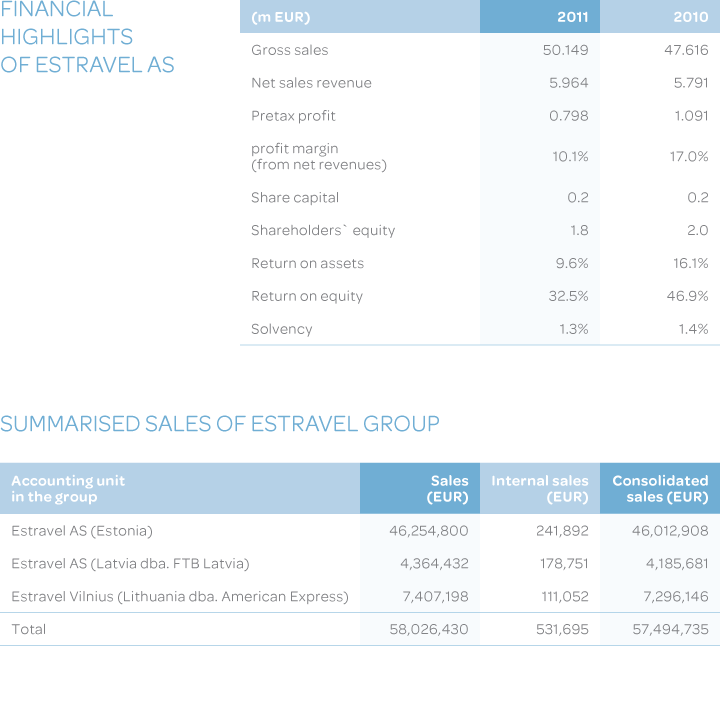
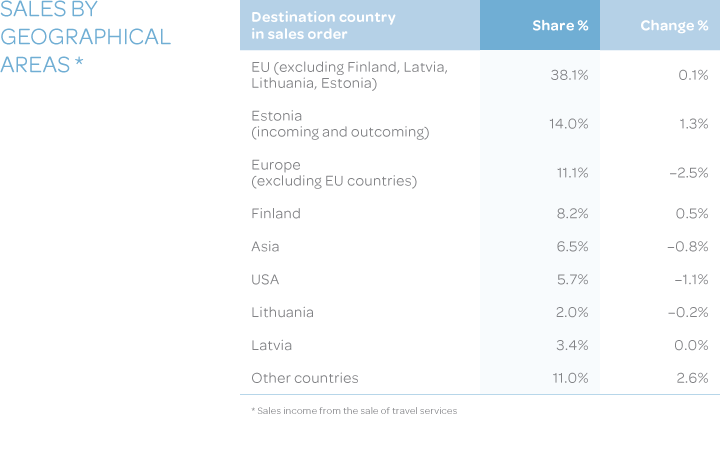
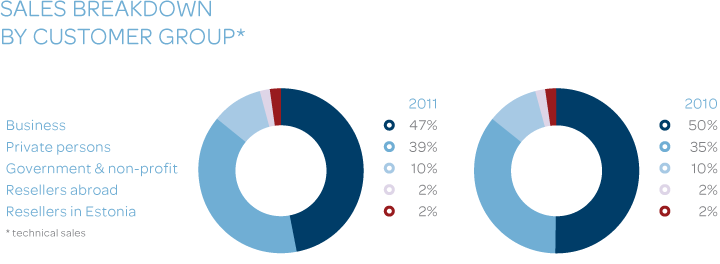



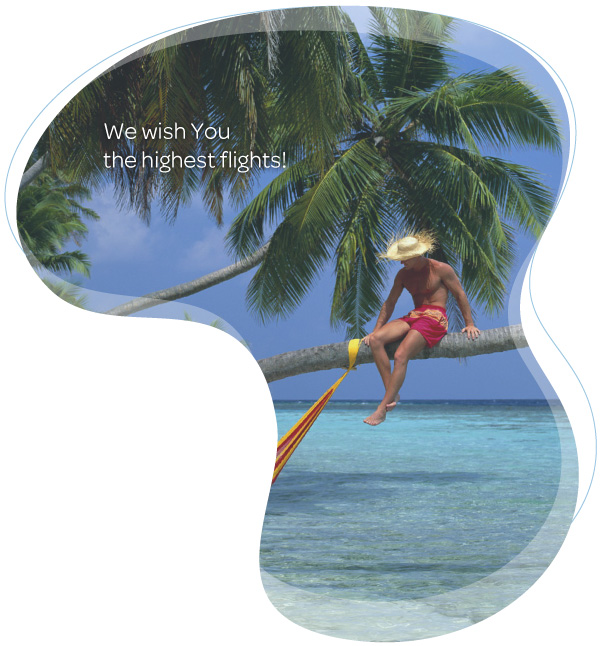
Estravel’s target was to increase the sales of airline tickets by 5% in 2011 compared to the previous year. The actual outcome was slightly lower than planned. The first months of 2011 were difficult and ones in which Estonia’s changeover to the euro played a certain role. The second half of the year was much more successful in terms of airline ticket sales and the final outcome exceeded the numbers of 2010.
There were more flights and carriers from Tallinn. Ryanair vigorously increased traveller numbers. At the beginning of the year, Blue1, a subsidiary of SAS, opened a direct route to Helsinki, which unfortunately did not last long and was closed down after a few months. The former glory of SAS in the Estonian market is receding: their share in Estonian Air has dropped to 10% and the lack of their own flights compared to the 1990s has reduced their market share more than ten-fold. In the last months of the previous year, the share of the Scandinavian airline in the sales of Estravel was less than 3%.
In the autumn months of 2011, the Russian airline Utair opened a direct air service from Tallinn to Moscow’s Vnukovo Airport. At the same time, a new airline, Flybe Nordic, created in cooperation between British Flybe and Finnair, began to offer many connections between Tallinn and various small Finnish cities. Unfortunately, Flybe’s ambitions did not match the market demand and most of the launched routes were discontinued at the beginning of 2012. What remained were connections operated for Finnair from Tallinn (and Tartu) to Helsinki and flights from Tallinn to Stockholm.
The most important news about our market was in regard to the extension plans and changes in the strategy of Estonian Air. These mainly concerned the extension of the flight network and the increase in the proportion of transit flights. The coming years will show whether the plans have actually been realised.
2011 will be remembered for the crisis in the Latvian airline, Air Baltic, the fast expansion of which caused serious financial problems. The fate of the airline was long a subject of interest for the media and published speculations influenced many people’s travel plans. The Latvian state offered a solution to the financial problems by taking over the company.
From the global market standpoint, 2011 was characterised by increasing oil prices, which resulted in higher priced airline tickets for the end consumer. The merger of large airline companies was also one of the price growth drivers. Consequently, the earliest possible purchase of tickets became increasingly important for the price-sensitive clients.

2011 was a very positive year for Estonian tourism as a whole as well as for Estravel – the number of both domestic and foreign tourist visits increased. One of the factors that positively affected the number of foreign tourist visits was certainly the increased awareness and reliability of Estonia due to Tallinn’s Capital of Culture status and the changeover to the euro. This brought about a growth in the number of business and leisure tourists, and certainly culture tourists.
We actively participated in the joint project “Cultural Tourism 2011” of Tallinn and Turku, the Capitals of Culture in 2011. Our increased activities on foreign markets, such as participation in international tourism fairs in St. Petersburg, Berlin and Barcelona, certainly had a positive effect. Participating in workshops organised at the Shanghai World Exhibition as a member of MTÜ Expoturism and networking events organised by the Estonian Chamber of Commerce and Industry in Estonia as well as target countries, such as in Moldova, also attributed to our success. The number of cruise ships served by us slightly rose, and the largest proportion of tourists we catered for came from Germany.
The growth of turnover in the domestic market was primarily the result of successful marketing campaigns:
cooperation with Rimi, summer family holiday campaign, etc. The most popular service booked through Estravel was a spa holiday in Estonia and various cultural tours also continued to be popular.
Estravel was a partner in organising several successful conferences and big events in 2011. During the year, we organised several international conferences such as “Materials and Technologies for Green Chemistry” promoting sustainable production, “PAY GAP” dealing with pay gap issues, “MIND THE GAP” for landscape architects, and others. Altogether, 1,500 people from almost 50 countries participated in our 2011 big events.

The interest of clients in travelling to warm countries was considerable, thereby increasing the sales of leisure travel. The number and selection of destinations offered by Estravel was larger than that in 2010.
In summer 2011, the list of travel destinations for our clients included locations such as the Algarve and Azores in Portugal, Lido di Jesolo and Sicily in Italy, Loutraki in Greece, and the cosy Greek holiday islands of Rhodes and Corfu. Last winter, many chose the distant and exotic Thailand as their favourite destination, which attracted Estonian tourists with its low prices, friendly people and good climate.
2011 brought about a change in the preferred destinations: while in 2010 the most popular destinations were
Egypt, Turkey and Greece, in 2011 Turkey, the Canary Islands and the surprise distant destination Thailand topped the rankings. The reasons for the fall of the formerly highly popular Egypt are not hard to determine: the unstable political situation made Estonian travellers anxious, which led to them subsequently choosing other travel destinations.
The average overnight hotel accommodation price dropped because a large share of clients are price sensitive and prefer cheaper alternatives.
